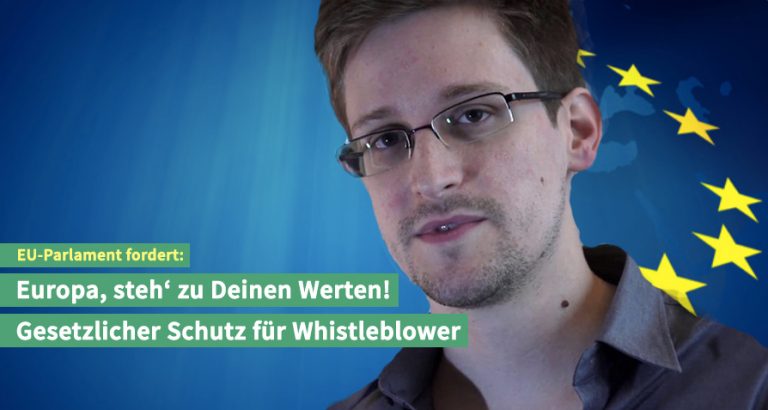Liebe Freundinnen und Freunde,
Liebe Interessierte,
letzten Freitag hat die EU-Kommission das Konsultationsverfahren zu einer möglichen Gesetzgebung zum Schutz von Whistleblowern in Europa gestartet. Die Grünen/EFA-Fraktion fordert seit Monaten eine entsprechende Richtlinie (hier unser Vorschlag, um Menschen zu schützen, die Missstände von öffentlichem Interesse publik machen. Unseren Vorschlag für eine Richtlinie finden Sie hier: http://www.greens-efa.eu/en/article/whistle-blowers-directive/
Es ist ein großer Erfolg, dass die Europäische Kommission dem Druck jetzt nachgibt und das Konsultationsverfahren startet. Wir brauchen einen umfassenden, europäischen Schutz für Whistleblower. Skandale wie Luxleaks oder Panama Papers zeigen, wie wichtig es ist, dass Menschen geschützt werden, die sich trauen, Skandale öffentlich zu machen, die der Gesellschaft schaden. Es darf nicht sein, dass sie wie Antoine Deltour in Luxemburg Zivil- und strafrechtlich verfolgt werden.
Wenn sich möglichst viele am Konsultationsprozess beteiligen und die Europäische Kommission auffordern, einen ambitionierten Schutzstatus auf europäischer Ebene zu schaffen, würde das sehr helfen. Wir wollen, dass die EU-Kommission möglichst schnell eine starke Richtlinie vorlegt. Deshalb fordern wir euch auf, die Möglichkeit wahrzunehmen bis zum Einsendeschluss 29. Mai den Fragebogen der EU-Kommission unter https://ec.europa.eu/eusurvey/runner/whistleblowerprotection2017 ausfüllen. Teilnehmen können sowohl Organisationen als auch Einzelpersonen. Wir würden uns über Eingaben für umfassenden europäische Schutzstandards freuen!
Herzliche Grüße aus Brüssel
Sven Giegold
Hintergrund: Grüne Prinzipien für umfassenden Whistleblowerschutz
- Both public and private bodies should be obliged to protect whistleblowers: Waste, misconduct and corruption affect all sectors, and freedom of expression and freedom of information must also be protected in all sectors.
- Whistleblowers should be able to report on wrongdoing and reveal information that is in the public interest: Alerts should not be limited to purely illegal activities but should also cover other forms of misconduct or wrongdoing. Threats to the public interest that have occurred, are occurring, or are likely to occur should also be covered. Exclusive lists should be avoided, and instead indicative lists covering a wide range of examples should be put forward: environmental protection, health and safety, public finance, violations of human rights, corruption and fraud, discrimination, conflicts of interest, public safety, the functioning of the internal market, etc.
- Whistleblowers should be protected in all fields of EU competence: Sector-specific legislation should be avoided. For example, proposing legislation to only protect whistleblowers that report mis-spending of EU funds leaves out mis-spending of national funds, and all the other areas (environmental, social, health-related) as well.
- Whistleblowers should be free to report both internally and externally: We believe that whistleblowers should be protected no matter what their choice of reporting channel is. In the Greens/EFA Directive we proposed that it should be possible for whistleblowers to disclosure information either alternatively or cumulatively, and in various ways – internally within the workplace, externally to the competent authorities, parliamentarians and oversight agencies, trade unions and employers’ associations, and also to the public through the media or non-governmental organisations.
- Whistleblowers’ reports should be quickly and seriously investigated: Investigations into the issues raised by whistleblowers should be conducted independently and within the shortest time frame possible, protecting also the rights of individuals that might be implicated by a disclosure. Both the whistleblower and any person implicated by a disclosure should be able to provide additional arguments and evidence throughout the investigation, and they should be kept informed of the handling of the disclosure.
- Whistleblowers should not suffer as a result of their disclosures: Whistleblowers should be able to report information anonymously and to have their identity kept secret. They should be exempted from both criminal and civil proceedings related to the disclosure as well as from other disciplinary measures or other forms of reprisal (including dismissal, demotion, withholding of promotion, etc). They should have the possibility, wherever it fits with the national legal system, to file for interim or injunctive relief in order to prevent dismissal until the outcome of the whistleblowing case has been established.
- Whistleblowers should not bear the burden of proof: Whistleblowers who disclosure inaccurate information in honest error should still be protected, and they should not have to prove that they acted in good faith. The only thing that matters is whether the information they revealed was in the public interest or whether it revealed wrongdoing or other misconduct (in the case of a purely internal disclosure).
- There should be sanctions for harassing whistleblowers, or their family or colleagues: Those who harass whistleblowers, their family or their close colleagues as a result of a disclosure, should be held liable. The employer must be the one that demonstrates that any measures taken against a whistle-blower are completely unrelated to the information revealed. Action taken against colleagues or family members as a result of the protected disclosure should also be prohibited and sanctioned.
- Whistleblowers should be given advice as well as legal, financial and psychological support: Whistleblowers should have access to independent legal advice on their case and to an attorney, and they should be given psychological support and/or treatment if needed. Whistleblowers should also be able to claim compensation for any harassment suffered or the loss of current or future livelihood, if the damage occurred in retaliation for a protected disclosure. Whistleblowers, their family members or colleagues who are at risk should be protected by the State.

